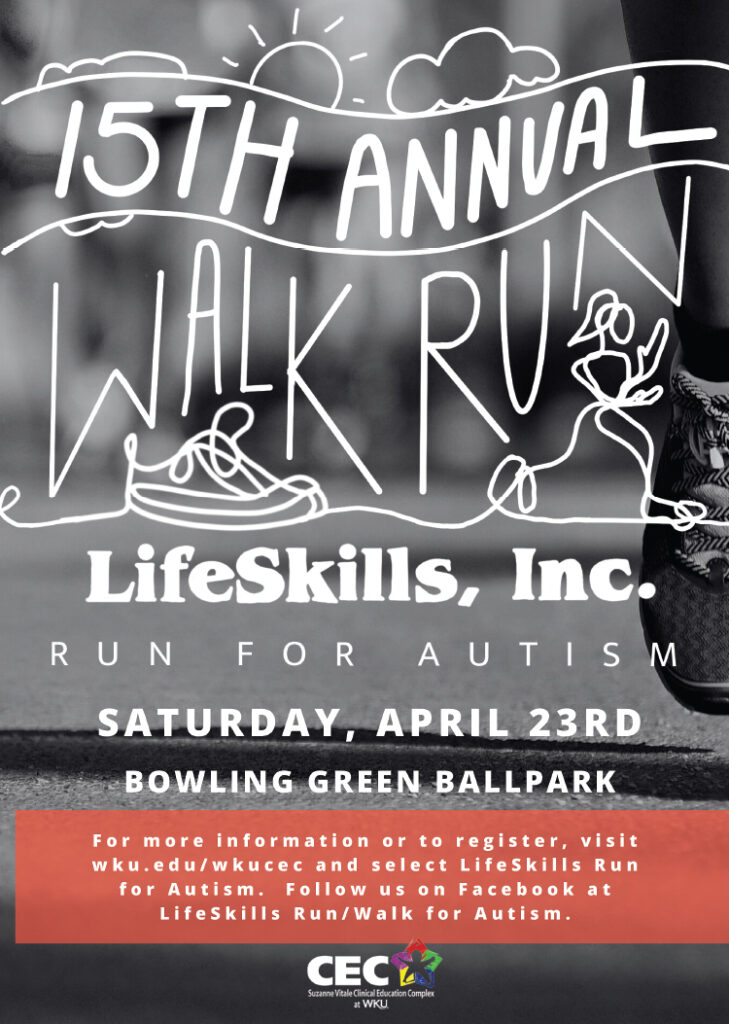
Chances are you know, or know of, someone with autism spectrum disorder (ASD). Currently, one in 44 children are diagnosed with autism – a developmental disorder of variable severity characterized by difficulty in social interaction and communication, and by restricted or repetitive patterns of thought and behavior.
Autism is a lifelong neurological condition. Presently, more than 5.4 million adults in the U.S., or 2.2% of the U.S. population, are on the autism spectrum.
Once diagnosed, children with autism receive specialized educational and support services, but as they grow into adults, many will fall off the proverbial “service cliff” and find themselves experiencing something referred to as “failure to launch.” In need of support as they transition to adulthood, programs like LifeWorks at WKU serve as their bridge to a life of independence.
Located in Bowling Green, LifeWorks is a non-profit 501(c)3, two-year postsecondary certificate program designed to prepare young adults with autism and other learning differences for successful transition to work and independent living. Our participants develop crucial skills in the areas of career-readiness, self-reliance and social interaction.
LifeWorks was created as a continuation of the lifespan of services provided by the Suzanne Vitale Clinical Education Complex (CEC) at Western Kentucky University. Established in 2006, the CEC houses the Family Resource Program, Communication Disorders Clinic, the Renshaw Early Childhood Center (or Big Red School), and the Kelly Autism Program. The Kelly Autism Program has a Prime-Time Program for elementary, middle and high school students, and a Circle of Support Program that provides support for WKU students with autism as they navigate their way through college. The programs at the CEC are available for individuals 12 months old through college-age.
In 2020, LifeWorks welcomed its first cohort of participants to address the ever-growing need of providing independent living support for young adults with ASD. LifeWorks offers two distinct learning pathways through the LifeWorks Transition Academy and LifeWorks Bridge Program. Additionally, LifeWorks is a Community Rehabilitation Provider for the Kentucky Office of Vocational Rehabilitation (OVR) providing Pre-Employment Transition Services (Pre-ETS) as well as Supported Employment services.
Participants of the two-year LifeWorks Transition Academy reside in an intimate, supportive campus setting known as The Julie & Gary Ransdell Living and Learning Community. The residential complex consists of townhouse-style apartments where participants live independently while developing daily living skills and building confidence in their abilities to make responsible decisions – both with support and on their own.
Over the course of two years, participants take part in a 32-course curriculum. Our instructors use the proven Learn4Independence® program developed especially for young adults with autism. The curriculum covers a variety of crucial skill-building areas, such as finance, safety, relationships, nutrition, health solutions and transportation.
In addition, participants learn to engage with the community through service learning, volunteering up to 10 hours per week at various charitable organizations. They also take part, and organize their own, social activities learning to build relationships and enjoy the good things in life.
The LifeWorks Bridge Program offers a non-residential option for participants to take courses, volunteer and engage in group activities while living off-site.
As one of only a few programs across the country – and the only one of its kind in Kentucky – LifeWorks provides a person-centered approach to helping individuals develop career-readiness skills while building confidence in their abilities to independently support and care for themselves.
A typical LifeWorks participant is a young adult between the ages of 21-30 who has been diagnosed with autism or some other learning difference. They range from low-average to high intelligence and come from a variety of educational levels and backgrounds. They are motivated to learn and have the capabilities to maintain personal safety. And they all possess a desire to live independently and ultimately support themselves through gainful employment. Many of them have successfully graduated from college but find themselves as one of the 85% of autistic adults who are unemployed or underemployed.
The LifeWorks at WKU program is unique in that it is not a long-term residential program but rather a runway, or launching pad, where individuals transitioning to adulthood take flight. LifeWorks facilitates a living and learning environment that empowers individuals with autism and other learning differences to realize their full potential and successfully lead lives of independence, self-direction, employment and inclusion.
To learn more, visit www.lifeworksatwku.org.
-submitted by LifeWorks
We invite you take part in the 15th Annual LifeSkills Run for Autism on Saturday, April 23 at the Bowling Green Ballpark! This event will include something for everyone: a 4 Mile Run, a 1 Mile Kid’s Run, a 1 Mile Fun Walk and, NEW THIS YEAR, a 1 Mile Fun Run! The 4 Mile Run is a Bowling Green Road Runners Grand Prix Event! The 1 Mile Run is a Fun Run and will not be timed. The 4 Mile Run will be in-person ONLY. The 1 Mile Kids Run, 1 Mile Fun Walk, and 1 Mile Fun Run may be completed virtually (during the month of April) or in-person at Bowling Green Ballpark on Saturday, April 23. We encourage everyone to take photos and add them to the event Facebook page (LifeSkills Run/Walk for Autism) with the hashtag #runwalk4asd.
Website Info: https://www.wku.edu/wkucec/lifeskillsrunforautism.php
Ticket website: https://www.eventbrite.com/e/2022-lifeskills-run-for-autism-tickets-276928539717

